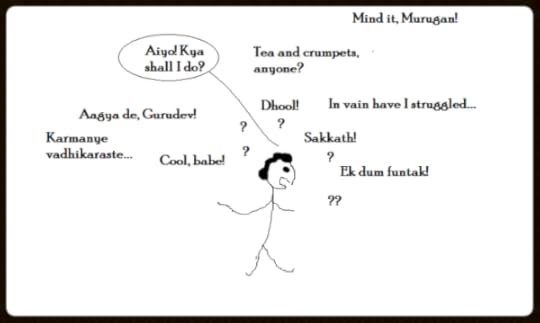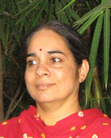To get straight to the point:
Dialogue!

Indians who read English fiction typically begin on British literature, all the good and bad that that stands for. As we grow up, we read the literature of other countries, including our own, in original English or translations. Often, we are thrown by the unfamiliarity of the Indian reality represented by Indian writers in books. It is a taste we have to acquire by exposing ourselves to it in small doses. Then there are the aural language inputs, which is another thing altogether. At home, school, play and work, we hear a variety of Indian languages in a variety of styles, including epic, folk and slang. Of course the TV spews Americanish at us all day and -- given the smart, funny, catchy dialogue -- we pick up a lot of that too.
So when it comes to writing dialogue, we have this vast clamour of voices in our heads, trying to get out. Sometimes we magically get it right; sometimes the mix is unconvincing, and the more you tinker with it, the worse it gets. Contemporary writers of adult fiction, I think, have cracked the problem of dialogue. And the new generation of picture books and books for younger children flow easily too.
Writing for middle grade and YA seems to be the toughest, maybe because children of that age seem to favour 'one-of-the-gang' voices (judging from the bestseller lists). Unless you are a teacher or a parent with children of the right age, or you have a very good ear for speech, you'll very likely be unfamiliar with the current slang. What you can do then is narrate more and reduce dialogue, if your subject lends itself to this (Siddhartha Sarma's
The Grasshopper's Run is a prime example of this). But what if your subject
demands dialogue? In such a case, I favour plain English, with a sprinkling of Indian words where there is no exact English equivalent. I don't like books where the writer goes all out and bungs in all the slang he/she can muster. It seems like they're trying too hard to impress, which invariably has the reverse effect. (But then, I'm not their target audience.) An alternate and of course much more difficult course is to invent a new slang for your characters. That's my plan for my next book. You'll know in a few years if I succeeded!
What's
your magic formula?
Published on August 06, 2014 04:13
 newest »
newest »
 newest »
newest »
 This is an interesting quesion! I love dialogue and I much prefer it to description or narration. I'm fully with you in that I'm not a fan of the overuse of slang and prefer plain English. The difficult part, I find, is to have believable dialogue within these parameters, because, no matter what people say, the way dialogue is written is different from real speech.
This is an interesting quesion! I love dialogue and I much prefer it to description or narration. I'm fully with you in that I'm not a fan of the overuse of slang and prefer plain English. The difficult part, I find, is to have believable dialogue within these parameters, because, no matter what people say, the way dialogue is written is different from real speech.




